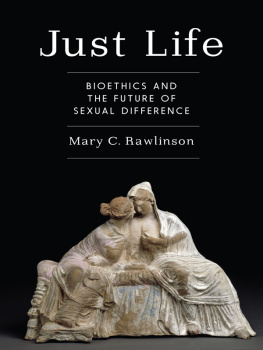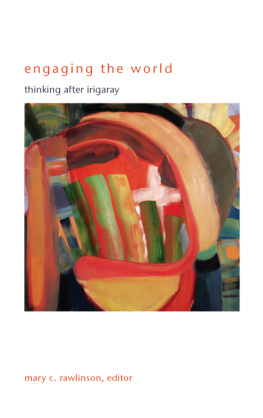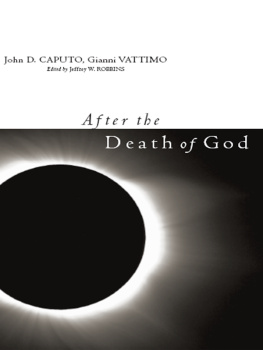Just Life
Just Life
BIOETHICS AND THE FUTURE OF SEXUAL DIFFERENCE
Mary C. Rawlinson
Columbia University Press
New York
Columbia University Press
Publishers Since 1893
New York Chichester, West Sussex
cup.columbia.edu
Copyright 2016 Columbia University Press
All rights reserved
E-ISBN 978-0-231-54119-0
Library of Congress Cataloging-in-Publication Data
Names: Rawlinson, Mary C.
Title: The right to life: bioethics and the future of sexual difference / Mary C. Rawlinson.
Description: New York : Columbia University Press, [2016] |
Includes bibliographical references and index.
Identifiers: LCCN 2015018088 | ISBN 9780231171748 (cloth : alk. paper) |
ISBN 9780231171755 (pbk. : alk. paper) | ISBN 9780231541190 (e-book)
Subjects: LCSH: Feminist theory. | Bioethics.
Classification: LCC HQ1190. R39 2016 | DDC 305.4201dc23
LC record available at http://lccn.loc.gov/2015018088
A Columbia University Press E-book.
CUP would be pleased to hear about your reading experience with this e-book at .
Cover design: Jordan Wannemacher
Cover image: The Trustees of the British Museum
References to websites (URLs) were accurate at the time of writing. Neither the author nor Columbia University Press is responsible for URLs that may have expired or changed since the manuscript was prepared.
To Alexander and the future
And in grateful memory of those who came before and are no longer here
Guinevere Hornsby Rawlinson, Robert Moledis Rawlinson Jr., and Mary Louisa Hall Rawlinson
Contents
All the speculation about overcoming the natural in the universal forgets that nature is not one. The universal has been thought as one, thought on the basis of one. But this one does not exist.
LUCE IRIGARAY, HUMAN NATURE IS TWO (1996)
One thing I want to say to all who would dismiss my feminist criticisms of my culture, using my westernization as a whiplash, is that my mothers pain too has rustled among the pages of all those books I have read that partly constitute my Westernization, and has crept into all the suitcases I have ever packed for my several exiles.
UMA NARAYAN, CONTESTING CULTURES (1997)
An international feminism that is going to have any bite quickly gets involved in making normative recommendations that cross boundaries of culture, nation, religion, race, and class.
MARTHA NUSSBAUM, WOMEN AND HUMAN DEVELOPMENT (2000)
A BAND OF frolicking girls at liberty. A mother who will not give up her daughter who is also a mother. A girl with a book. Might these be figures of the universal in human experience?
Philosophy seems to offer only two attitudes toward the universal. Either the philosopher commits to the task of articulating the universal forms and laws of experience under the regulative ideal of the One, as if human experience could be captured in a single narrative, or the philosopher criticizes the idea of the universal for this very commitment and, in exposing the exclusions that are required to install the supposedly generic subject of the one narrative, rejects the idea of the universal altogether.
Critical phenomenology starts from the idea that universality appears in multiplicity and difference. More than one narrative will be necessary to do justice to life. Womens experience (and there will be others) is just as much an opportunity for the appearance of the universal as is Mans. Critical phenomenology resists both abstract universalism and cultural relativism.
Critical phenomenology analyses the forms and laws of experience as determined by a history of power in order to open the opportunity for other narratives and figures of identity. More than an adjustment in the distribution of goods, justice requires new styles of life and new forms of association, reflecting, beyond the rights of Man, universals aimed at health and happiness, rather than the concentration of wealth and the proliferation of elite zones of security.
The infrastructures that support the subjection of women, the capitalization of their bodies, and the marginalization of women in public debate are transcultural and make transcultural critique necessary to critical phenomenology. The irreducibility of sexual difference makes solidarity possible.
Both Saudi Arabia and the United States embrace the rhetoric of rights, but tolerate, as if it were unremarkable, limitations on womens bodily sovereignty, their access to meaningful work, and their participation in decision making.
They lack mobility, independence, and voice. The women of Saudi Arabia are denied agency and mobility by their own culture, rather than by an occupying or enslaving power, and it is the critics of that subjection who are cast as a colonizing force, imposing Western concepts of liberty and freedom. The ability to make decisions for ones self, to move about and speak freely, to make ones own decisions about sexuality and reproduction, not to find ones body at the mercy of another: the assumption that these values are alien to Arab women not only serves security and wealth in the Anglo-European countries by leaving the relationship to Saudi Arabia undisturbed but also assumes that some classes of humanbodies are happy to surrender their agency, mobility, and bodies to others.
In the United States, a country supposedly founded on an inviolable commitment to religious freedom, the state continues to conspire with unconstitutional efforts to deny women access to basic health services such as contraception and pregnancy management. As for protecting the vulnerable: 85 percent of the victims of domestic violence in the United States are women. In a country founded on equality of opportunity, women make 20 percent less than men for comparable work. While African Americans and Hispanics are more than twice as likely to be poor as white Americans, women are poorer than men in all racial groups. A quarter of these women are mothers. In 2014, in this democracy, women held only 18.5 percent of the seats in the House of Representatives and 20 percent of the seats in the Senate. The fifteen-member Cabinet included three women, at Health and Human Services, the Interior, and Commerce. Four women served previously at Health and Human Services, Homeland Security, Labor, and State. No woman has ever served as president or vice president of the United States. While women comprise about half of graduating classes in law and medicine, they remain dramatically underrepresented among deans and department chairs. In 2014 twenty-five women serve as CEOs of a Fortune 500, only one in the top ten and only two in the top twenty-five. An additional twenty-eight women serve as CEOs of Fortune 501one thousand companies. In every field of public life in the U.S., women have only very limited participation in decisions about the future.













